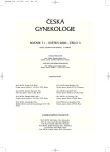Discrepancy of Ultrasound Biometric Parameters of the Head (HC - Head Circumference, BPD - Biparietal Diameter) and Femur Length in Relation to Sex of the Fetus and Duration of Pregnancy
Diskrepance ultrazvukových biometrických parametrů hlavičky (HC – head circumference, BPD – biparietal diameter) a délky stehenní kosti (FL – femur lenght) v závislosti na pohlaví plodu a délce těhotenství
Cíl studie:
Srovnání fetálních ultrazvukových biometrických parametrů hlavičky (obvod – HC, biparietální průměr – BPD) a stehenní kosti (délka femuru – FL) s ohledem na délku těhotenství a pohlaví plodu.
Typ studie:
Prospektivní studie.
Název a sídlo pracoviště:
Gynekologicko-porodnická klinika, Ústav lékařské genetiky a fetální medicíny, Ústav preventivního lékařství LF Univerzity Palackého a FN, Olomouc.
Metodika:
Ultrazvuková biometrie byla prováděna v souladu s metodikou uvedenou v referenčních tabulkách. U všech plodů bylo změřeno HC, BPD a FL. Ze studie byla vyloučena riziková těhotenství, plody v poloze koncem pánevním a vícečetná těhotenství.
Výsledky:
Celkem bylo provedeno 427 ultrazvukových biometrií mezi 16.–38. týdnem těhotenství. Plody mužského pohlaví měly signifikantně větší obvod hlavičky (HC) i biparietální průměr (BPD) ve srovnání s plody ženského pohlaví a s délkou těhotenství rozdíl narůstal. V období do 20. týdne byl rozdíl (HC + 3,9 dne; 3,0 %, a BPD + 4,1; 3,2 %), mezi 20.–30. týdnem (HC + 6,8 dne; 4,3 %, a BPD + 6,9 ; 4,4 %) a po 30. týdnu (HC + 12,3 dne; 5,6 %, a BPD + 12,9; 5,9 %). V období do 20. týdne byl rozdíl mezi HC a FL u plodů mužského pohlaví + 2,1 dne (95%Cl 1,7–2,6; p <0,001), mezi 20.–30. týdnem + 3,4 dny (95%Cl 2,5–4,2; p <0,001) a po 30. týdnu + 9,7 dne (95%Cl 7,3–12,1; p <0,001).
Závěr:
Podle výsledků této studie mají plody mužského pohlaví signifikantně větší biparietální průměr i obvod hlavičky. Rozdíl je patrný již od 16. týdne těhotenství a narůstá s délkou gestace. Při nálezu diskrepance v ultrazvukové biometrii hlavičky plodu a délkou stehenní kosti by mělo být zohledněno i pohlaví plodu.
Klíčová slova:
ultrazvuk, biometrie, BPD, HC, pohlaví plodu
Authors:
M. Lubušký 1,2; I. Míčková 2; M. Procházka 1; P. Dzvinčuk 1; K. Malá 1; L. Čížek 3; V. Janout 3
Authors‘ workplace:
Porodnicko-Gynekologická klinika LF UP a FN, Olomouc, přednosta prof. MUDr. M. Kudela, CSc.
1; Ústav lékařské genetiky a fetální medicíny LF UP a FN, Olomouc, přednosta prof. MUDr. J. Šantavý, CSc.
2; Ústav preventivního lékařství LF UP, Olomouc, přednosta prof. MUDr. V. Janout, CSc.
3
Published in:
Ceska Gynekol 2006; 71(3): 169-172
Category:
Original Article
Overview
Objective:
To compare female and male fetuses in terms of intrauterine ultrasound growth measurements (HC - head circumference, BPD - biparietal diameter, FL - femur lenght) depending on gestational age.
Design:
A prospective study.
Setting:
Department of Obstetrics and Gynecology, Department of Medical Genetics and Fetal Medicine,
Department of Preventive Medicine, University Hospital, Olomouc.
Methods:
All ultrasound biometric measurements were performed according to the methodology published with the reference charts. Risk pregnancies, multiple pregnancies and breech presentations were excluded.
Results:
Fetal HC, BPD and FL were measured in 427 ultrasound examinations at 16 - 38 weeks. Male fetuses had significantly larger HC and BPD measurements compared to female fetuses and these differences increased with advancing gestation. In the 16 - 21 week scans estimated difference was (HC + 3.9 days, 3.0% and BPD + 4.1, 3.2%), during the 21 - 30 week scans (HC + 6.8 days, 4.3% and BPD + 6.9, 4.4%) and in the 31 - 38 week scans (HC + 12.3 days, 5.6% and BPD + 12.9, 5.9%) for males. Male fetuses had significantly larger HC compared to FL measurements. In the 16 - 21 week scans, estimated difference was + 2.1 days (95%Cl 1.7 - 2.6, P < 0.001), during the 21 - 30 week scans + 3.4 days (95%Cl 2.5 - 4.2, P < 0.001) and in the 31 - 38 week scans + 9.7 days (95%Cl 7.3 - 12.1, P < 0.001).
Conclusion:
This study suggests that male fetuses have significantly larger head circumference (HC) and biparietal diameter (BPD) measurements compared to female fetuses. These prenatal sex-related differences are established by as early as 16 weeks of gestation and tend to increase with advancing gestational age. In the case of discrepancy finding between head (HC, BPD) and femur lenght (FL) measurements the fetal gender should be taken into account.
Key words:
fetal sex, gender differences, ultrasonography, biometry, intrauterine growth
Labels
Paediatric gynaecology Gynaecology and obstetrics Reproduction medicineArticle was published in
Czech Gynaecology

2006 Issue 3
Most read in this issue
- Discrepancy of Ultrasound Biometric Parameters of the Head (HC - Head Circumference, BPD - Biparietal Diameter) and Femur Length in Relation to Sex of the Fetus and Duration of Pregnancy
- Serum Antibodies against Annexin V and Other Phospholipids in Women with Fertility Failure
- Intrahepatic Cholestasis of Pregnancy – Four Case Reports
- Prevention of Rh (D) Alloimmunization in Rh (D) Negative Women in Pregnancy and after Birth of Rh (D) Positive Infant
